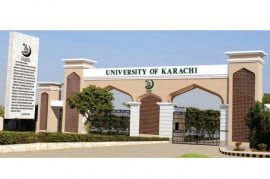
India is considered one of the world’s largest democracies where capitalism thrives. Pakistan, however, is thought to be the diametrical opposite, where feudal landholders and bureaucratic elite have a strong grip on state power. Dr Amin-Khan, who is an associate professor at the politics and public administration department of Ryerson University, Toronto, tries to explain this by shedding light on elusive factors which prevailed during the end of the British Raj. Routledge published the book internationally in December 2011 under the title ‘The Post-Colonial State in the Era of Capitalist Globalization’. It has now been published in Pakistan by Vanguard Books. The 249-page book costs Rs995.
A book launch was held on Thursday evening at The Second Floor (T2F) in which Dr Amin-Khan shared some of the findings of his meticulous research with the audience. “The process of state formation in the post-colonial era is different from the formation of the Western capitalist states,” Dr Amin-Khan told The Express Tribune. In an attempt to explain the difference, Dr Amin-Khan took up India and Pakistan as a case study for his PhD thesis, which after three reviews, eventually culminated in this book. The event started with a candid review by Masood Ali Naqvi, a member of the Institute of Chartered Accountants of Pakistan. He said that at first glance, the book did not interest him much but once he started reading, he had great difficulty in putting it down.
“Amin-Khan’s work is based on hardcore research and a layman might find it difficult to read on the first go,” he said. “But once you get into it, you can’t help but to find it thoroughly interesting.”
Naqvi presented the crux of Dr Amin-Khan’s thesis by saying most post-colonial states remained dependant on the socioeconomic and political structures that the governing imperialist regimes had created. What determined the particular trajectory of a country, however, was which section of the indigenous society had gained power after decolonisation. “The majority of post-colonial states, either because of dependency or the mindset of ruling classes failed to develop an autonomous political and social framework.”
Naqvi added that following independence, India stepped into a state-directed development process via industrialisation, ideology of self-reliance and an independent foreign policy. “The focus on the non-aligned state policy from day one had helped India to stay in the path of progress,” said Naqvi.
Lateef Chaudhry, National Students Federation’s former president, also spoke at the event, declaring the book a “good addition in political literature” on the subcontinent. “Only politically conscious youth can bring a change in society and for that, I urge them to read all sorts of literature.”
Published in The Express Tribune, November 3rd, 2012.
COMMENTS (5)
Comments are moderated and generally will be posted if they are on-topic and not abusive.
For more information, please see our Comments FAQ






1732783305-0/Untitled-design-(6)1732783305-0-270x192.webp)










This sounds like a very interesting book which raises some valid queries.
The land reforms in India, a solid political foundation and a strong corporate sector helped not only to develop India but ensure a certain amount of stability. Sure there is still over-whelming poverty, right-wing lunacy and some instability but generally it has been the strength of the corporate sector and the judiciary which has maintained a balance.
Pakistan on the other hand started off with weak political foundations (loss of Jinnah), a predominant feudal sector and a weak corporate sector. While the first two concerns remained, under Ayub Khan at least industrialization got a boost. This trend was finished by Bhutto who made matters worse by pandering to the mullah element.
So to counter A. Bajwa's argument, religion has nothing to do with it. The ethnic rifts within us in the sub-continent are just as bad as the religious ones.
The only thing of value that might actually save this country is a strong corporate sector.
About time we put our rose colored religious glasses down and looked at life for what it is. Both Pakistanis as well as Indians.
The people of Indus Valley are predominantly from Scythian and Parthian races who migrated to India much after the Aria people.The Hindu religion did not accept them into their fold.They subsequently got refuge in Islamic circle.That started the cultural rift which persists to date.
I think the word "trajectory" is important here because it implies continuity...an ongoing process of evolution and it's pretty clear to see that India and Pakistan are on different paths.
Much of the future-facing discussion in Pakistan centers around where Pakistan has gone wrong in the past. Partly that's because no one in Pakistan is offering a futurefacing vision right now. The army and the right-wing is obsessed with scoring victories over India, but nothing beyond that. The regious parties are after exclusivism and Sharia, but no thoughts for what after that? The seculer-leaning left pushes ideas about joining the internltional mainstream based on rational thought, liberalism, and logic. But they exist in a limited rarified space, just enough to maintain legitimate intellectual and diplomatic cover in world capitals.
While in India too the rightwing nuts only have the past to discuss, here there is a larger seculer constituency which capitalized on the first few decades after independence to establish an inclusive thought that (despite hiccups and challenges) has firmly given the country a sense of its future. While various groups and religions in India jockey for political space and power, no one questions anymore that we will all to sink or swim together. And the conversation today is firmly about that shared future. What shape the ongoing political discourse will take, how poverty will be alleviated, how population will be managed, what to do about corruption, how everyone will be fed and educated, how healthcare will be provided, all these are concerns that are discussed by everyone at all levels. Even the historically disenfranchised sectons of society are now talking about their rights and roads to prosperity. By no means is that an assured furutre, but we are all looking at it with increased confidence and ideas. This confidence has relegated the right-wing--with its vocabulary of gods, temples, and minority demonization--to a pesky side-show because people dont have time away from their pursuit of prosperity, and the rightw-ing has nothing else to offer.
I think we will continue this journey on our respective paths till Pakistan decides for itself what kind of future it wants and imagines a vision of itself that is more inclusive. The rightwing thinks of that as stepping away from an imagined Pakistan ideology. I think it is more like embracing the reality of Pakistan as a polyglot contry that could do with a little less exclusion in its internal spheres.
Bhutto unfortunately set the stage for Ziaul Haq to convert democratic Pakistan into a theocracy. Bhutto, being a landlord, wanted to be the Mao Zedong of Pakistan, but instead of using communism, used Islam and corrupted the constitution --- took the power from the hands of the citizens and gave it to Allah (no law that is against Islam and the Qur'an can be legislated). Eventually, his own politics took him to the gallows. This started our slide towards the black hole.
Pakistan's industrialization was regressed by Bhutto. It was booming in 1960s and Pakistan came a long way by then from what manufacturing facilities it had at Independence.